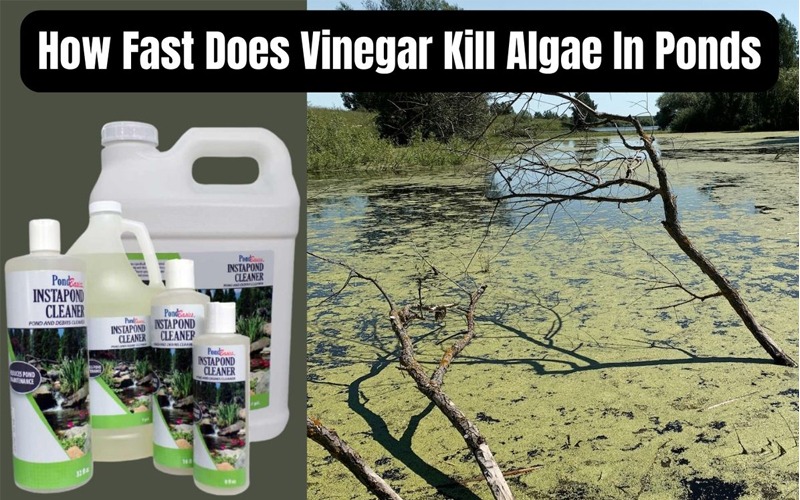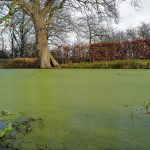Vinegar is a versatile household item, but when it comes to killing algae in ponds, its speed and effectiveness can vary based on several factors. In this article, we will tell you how fast does vinegar kill algae in ponds.
5 Best Pond Cleaner For Pond Algae And Muck
In the battle against algae, vinegar acts as a potential weapon, but it’s essential to understand that its potency depends on a multitude of variables. One of the critical factors impacting its speed is the concentration of vinegar used.
At a relatively low concentration, vinegar may take longer to kill algae. This is because the acetic acid in vinegar, which is its active ingredient, needs time to break down the algae’s cell walls and disrupt their growth.
Algae, those pesky green invaders of ponds, thrive in the presence of sunlight and nutrients. Their rapid growth can quickly turn a picturesque pond into a slimy, green mess. To combat this, many pond owners turn to vinegar as a natural and eco-friendly solution.
However, vinegar’s effectiveness in killing algae is subject to the concentration of acetic acid in the solution. When used at full strength, vinegar’s acetic acid can have a more immediate impact on algae.
It works by lowering the pH of the water, creating an environment that’s hostile to algae growth.
But let’s not forget about the size and depth of the pond itself. In a small, shallow pond, vinegar may disperse more quickly, making it easier to target algae. In contrast, a large, deep pond might require more time and vinegar to achieve the same results.
Temperature also plays a role in the speed at which vinegar kills algae. Warmer water temperatures can accelerate the chemical reactions involved in algae cell disruption, potentially speeding up the process.
Furthermore, the type of algae present can influence how quickly vinegar works. Some types of algae are more resilient than others, and their response to vinegar treatment may vary.
Green algae, for example, might be more susceptible to vinegar than other types like blue-green algae.
It’s essential to approach algae control with patience and a realistic understanding of vinegar’s limitations. While vinegar can be a natural and cost-effective solution for pond owners, it’s not a miracle cure.
Depending on the circumstances, it may take several days or even weeks to see significant results.
Another aspect to consider is the impact of vinegar on the overall ecosystem of the pond. While vinegar can help control algae, it can also affect other aquatic life in the pond.
The sudden pH drop caused by vinegar may stress or harm fish, amphibians, and beneficial bacteria. Therefore, it’s crucial to carefully monitor the pond’s inhabitants and water quality when using vinegar as an algae treatment.
But if you want to avoid fish harming and get rid of pond algae in natural or manual process then you can follow our previous article.
Frequently Asked Questions
Q: How fast does vinegar work to kill algae in ponds?
A: Vinegar’s speed in killing algae in ponds can vary based on factors such as concentration, algae type, and environmental conditions.
In some cases, visible results may be noticeable within a few days, while in others, it might take weeks of consistent treatment for significant algae control.
Q: What type of vinegar is best for killing algae in ponds?
A: White vinegar (distilled vinegar with 5% acetic acid) is typically recommended for killing algae in ponds. It’s readily available, cost-effective, and has a consistent acidity level.
Other types of vinegar like apple cider vinegar or specialty vinegar may also work but are less commonly used for this purpose.
Q: Is vinegar safe for fish and other aquatic life in the pond?
A: Vinegar can be harmful to fish and aquatic life due to its pH-lowering effect. Sudden pH changes can stress or harm them.
Careful monitoring and controlled use, with proper dilution, can help minimize risks to pond inhabitants, but caution is essential when using vinegar for algae control.
Q: Should I dilute the vinegar before using it in my pond?
A: Yes, it’s advisable to dilute vinegar before using it in your pond. A common ratio is one part vinegar to three parts water. Dilution helps prevent sudden pH fluctuations and minimizes the risk of harming fish and other aquatic life while still effectively controlling algae.
Q: How often should I apply vinegar to control algae in my pond?
A: The frequency of applying vinegar to control pond algae depends on algae severity. Initially, treat every 3-5 days for severe blooms. For maintenance, reduce to 1-2 weeks, adjusting based on pond conditions, season, and regular monitoring.
Q: What factors can influence the speed of vinegar’s algae-killing action?
A: Understanding the variables that affect vinegar’s effectiveness, such as water temperature and pond size, is crucial.
Q: Can vinegar completely eliminate all types of algae in a pond?
A: People often want to know if vinegar is a universal solution for all algae types or if some are more resistant.
Q: Are there any alternatives to vinegar for algae control in ponds?
A: Some pond owners may be exploring other natural or chemical options for algae management.
Q: Is there a risk of overdosing with vinegar in my pond?
A: Concerns about using too much vinegar and its potential consequences are common.
Q: How long should I wait after using vinegar before reintroducing fish to the pond?
A: Safety measures regarding the reintroduction of fish are important for maintaining a healthy pond ecosystem.
Q: Can I combine vinegar with other algae control methods for faster results?
A: People may inquire about using vinegar in conjunction with other treatments or strategies.
Q: Will vinegar harm the plants in my pond while targeting algae?
A: Understanding the impact of vinegar on aquatic plants is essential for maintaining a balanced ecosystem.
Q: What are the signs that vinegar treatment is working in my pond?
A: Pond owners often want to know how to gauge the effectiveness of vinegar in controlling algae.
Final Words
In summary, the speed at which vinegar kills algae in ponds can vary widely depending on factors like the concentration of vinegar, the size and depth of the pond, water temperature, the type of algae present, and its impact on the pond’s ecosystem.





